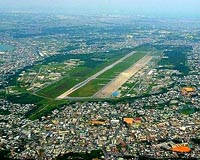| . |  |
. |
Ottawa (UPI) May 13, 2010 Canada's pitch for a two-year stint on the U.N. Security Council is coming under fire from activists within the country who claim Canada's candidacy is undeserved. Moves to scuttle Canada's bid for the temporary seat ahead of the October elections followed criticism of Prime Minister Stephen Harper and his government's policies on international aid, military involvement and foreign policy stance in the Middle East, environmental policies and trade. Canada, Germany and Portugal are vying for the two temporary seats on the 15-member Council that will become available for 2011-12 when Austria and Turkey complete their terms. In a sharp criticism of Canada's candidacy, the Council of Canadians told U.N. Secretary-General Ban Ki-moon that Canada didn't deserve the seat because it had failed to comply with "international norms" and also snubbed the world body in the past, a reference to Canada's refusal to sign the 2007 Declaration on the Rights of Indigenous Peoples. The United States, Australia and New Zealand are other non-signatories to that declaration. "Being one of only four countries that originally voted against the declaration is yet another example of Canada swimming against the current of international norms on human rights," said the council's campaign director Brent Patterson in a statement. The advocacy group also faulted Canada for not doing enough to cut down on greenhouse gas emissions. Christopher Mason wrote on the Governance Village Web site that Canada's decision to prioritize South America over many parts of Africa in its allocation of development aid also risked undermining Canada's candidacy. "That possibility illustrates the intense backroom lobbying fundamental to any country's hope of winning a seat on the powerful 15-seat U.N. council," Mason wrote. "As fellow U.N. members weigh the merits of Canada's candidacy, they will be paying a great deal of attention to recent decisions by Canada, from its foreign aid policy, to its military involvement, Middle East policies and trade relationships among other issues." Toronto Star columnist James Travers wrote that "for the first time (Canada is) facing charges that it's no longer the best neighbor on the international block." "At home and away, awkward questions are being asked about Canada's qualifications for Security Council membership," Travers wrote. He said Harper's "foreign policy has been downgraded to points of interest, primarily Washington, Tel Aviv and Kabul, connected to domestic politics by cross border trade, locking down the domestic Jewish vote and a far-away mission intended to prove Ottawa is as serious as the U.S about continental security. Add greater interest in the Caribbean, showcased here at (the recent) Haiti donor conference, and what passes for a foreign policy emerges." Bill Graham, who served Jean Chretien and Paul Martin as foreign minister, said the government policy of "Israel right-or-wrong and equivocal concern for Africa undermine once solid support in two vexed regions" for Canada's candidacy for the U.N. council. Other critics said Canada could face bloc opposition from the 56-nation Organization of Islamic Countries because of Harper's stated pro-Israel stance. Despite the doubts, however, analysts said Canada could still win the seat. Of the three candidates, Germany is the favorite, which pits Canada against Portugal for the second seat. There is likely to be reluctance to give preference to another European nation over Canada, analysts said. If Portugal does win, that will create further ill will in the United Nations because Portugal will join Germany, permanent members Britain and France, as well as Austria and Turkey to form a bloc of European members, though for a short while. Austrian and Turkish mandates expire at the end of 2010. "I am reminded of the race for the 1989 seat, when our two opponents were Greece and Finland," said Yves Fortier, Canada's U.N. envoy 1988-91, quoted by Governance Village. "We presented the too-many-Europeans argument and it was very successful." Fortier said that other countries, especially those with significant clout like the United States, Britain and France, recognize Canada's unique blend of influence and diplomacy and its ability to act as a middle power. "I believe that despite whatever blemishes we may have on our CV, we should be there," Fortier said. Canada has had a non-permanent seat on the Security Council at least once every decade since the United Nations was formed. Losing the current bid would break that streak, analysts said. "You can imagine the editorial comment that would flow if there is a rejection (of Canada's bid for a seat on the Security Council)," Allan Gotlieb, Canada's ambassador to Washington from 1981-89, told Governance Village.
Share This Article With Planet Earth
Related Links Learn about the Superpowers of the 21st Century at SpaceWar.com Learn about nuclear weapons doctrine and defense at SpaceWar.com
 Japan PM says may miss May deadline in US base row
Japan PM says may miss May deadline in US base rowTokyo (AFP) May 13, 2010 Japan's embattled prime minister conceded Thursday he may miss a self-imposed May 31 deadline to resolve a row over an unpopular US base that his officials discussed at the Pentagon this week. The dispute on the relocation of the noisy airbase on the southern island of Okinawa has strained ties with Washington for months and battered Yukio Hatoyama's support ratings ahead of upper house elec ... read more |
|
| The content herein, unless otherwise known to be public domain, are Copyright 1995-2010 - SpaceDaily. AFP and UPI Wire Stories are copyright Agence France-Presse and United Press International. ESA Portal Reports are copyright European Space Agency. All NASA sourced material is public domain. Additional copyrights may apply in whole or part to other bona fide parties. Advertising does not imply endorsement,agreement or approval of any opinions, statements or information provided by SpaceDaily on any Web page published or hosted by SpaceDaily. Privacy Statement |